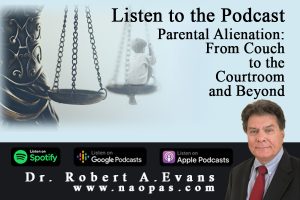What is Parental Alienation?
Parental Alienation refers to a child being alienated or estranged from a parent. There could be a variety of reasons for this break in the relationship. The word “break” presumes a relationship existed at one time and then severed. A possible reason for this break could be deliberate behaviors engaged in by one parent relative to the other parent that could be directed to or through the children designed to interfere with a parent’s relationship with their child.
There may be other reasons, however, that a child becomes alienated from a parent. Among these reasons are normal separation issues. Preschool children, for example, frequently display separation anxiety when leaving a bonded parent. Children’s temperament and a parent’s response to a separation issue can be key variables in how a child behaves; these have to be taken into account when considering alienation in a case. Also, one parent may be lacking appropriate parenting skills. Frequently a parent who has been on the periphery relative to child raising responsibilities, and with the onset of divorce or separation may just beginning to assume a participatory role with that child, may experience some reluctance from the child to spend time with that parent. In addition, some children may display oppositional behavior as in going through a stage of rejecting one or both parents. In intact families, this rejection may be developmentally normal. In divorcing families, this rejection may require more immediate and intense therapeutic intervention.





